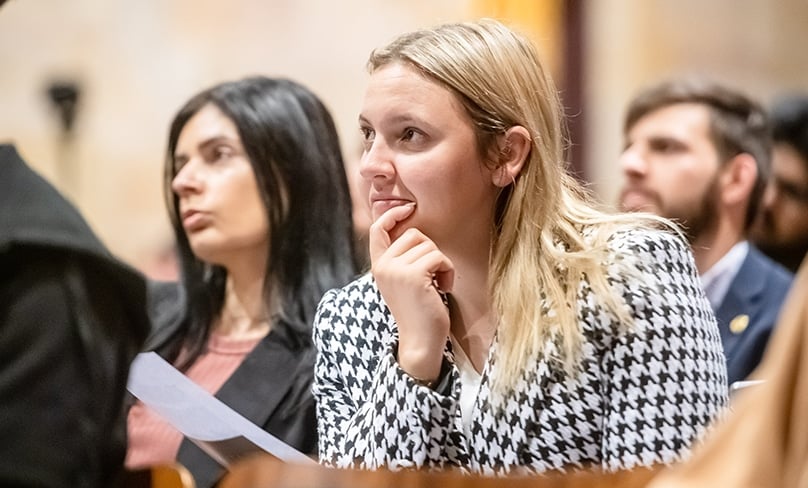True doctrinal development is always “perfectus, not permutatio—amplification, not transformation of one thing into another,” leading Catholic patristics scholar Fr Joseph Carola SJ told Sydneysiders at a lecture on 12 September.
The American Jesuit scholar, well-known to Catholics of the archdiocese, addressed clergy, students and members of the public at the latest instalment of the long-running Scholarship at the Cathedral series, held at Chapter Hall at St Mary’s Cathedral College.
With the Synod on Synodality’s first Roman session mere weeks away and already making waves in global Catholic media, Fr Carola spoke on the pressing topic of true and false doctrinal development.
Fr Carola drew on his expertise in the 19th century recovery of the fathers of the church, linking the writings of the 5th century monk St Vincent of Lérins with the 19th century cardinal and convert from Anglicanism, St John Henry Newman.
St Vincent is perhaps best-known for his famous definition of the Catholic faith: “What is believed everywhere, always, by all.”
But in his best-known text, the Commonitorium, from which the definition is drawn, he also provided certain principles for discerning true from false development.
In particular, Fr Carola said, St Vincent thought the antiquity of a doctrine—defined by councils and the consensus of the fathers—was to be preferred to “novelties” like the Donatist, Arian and other heresies.
“Basically, they’ve given themselves over to the Zeitgeist,” Fr Carola said, capturing St Vincent’s view of the villains of his age.
“They reject the manner of apostolic and Catholic doctrine, and delight in the dirt of heretical novelty.
“[St Vincent] asked the question though: ‘Is my rejection of novelty, of these new doctrines—is this really just coming out of my longing for the past? Is it just a matter of nostalgia?’
“‘Is it just my hatred of modernism,’ he asks, ‘and love for what was established as old, that I reject the novel?’
“He appeals to the martyrs of the church: ‘Their tenacious attachment to the ancient faith, is the reason why I too will tenaciously hold on to the ancient faith that has been revealed by Christ Jesus.’”
For St Vincent, false teaching in the church is “a trial for our own faith,” Fr Carola added, “a time for purification, when God permits eminent churchmen to teach contrary to the revealed truth.”
“What do faithful Catholics do in such a situation? They accept the teachers with the church, and do not desert the faith of the church with the [false] teachers.”

Fr Carola said that St John Henry Newman’s criteria for the develop of doctrine still show that while the “principles of faith might remain the same, how they manifest themselves can change.”
He cited the dogma of the Immaculate Conception, defined in 1854 by Pope Pius IX, as one such example.
Of St John Henry’s principles, Fr Carola said the most important for today’s church was that a development should have a “conservative action on its past.”
“So in other words, there’s no doctrinal reversal,” Fr Carola said. “The development of doctrine moves forward, it never goes backwards.”
“It’s never a denial of what had been before – it’s a clarification, an explication, but never denial, never refusal.
“A corruption is a development in that very stage in which it ceases to illustrate and begins to disturb the acquisitions gained in its previous history.”
Similarly, heresy could also be identified as “the refusal to develop when something is naturally and organically developing.”
“Heresy can get locked in a timewarp and not move forward. So in this odd way … heresy is in its own way conservative,” he said.
In an aside, Fr Carola also criticised the shopworn “cafeteria Catholic” metaphor, saying that the image of picking and choosing one’s own faith leaves you with an image of “a pretty decent meal.”
“It doesn’t actually bring home how destructive cafeteria Catholicism is,” he said, saying that the image of pulling threads out of a tapestry was to be preferred.
“What happens? The whole tapestry begins to unravel. You can’t just be pulling threads out of a tapestry and hope it will survive.”
Fr Carola was ordained in 1993, has lectured at the Gregorian University in Rome since 2002, and was invited to Australia at the invitation of the Australian Confraternity of Catholic Clergy. His most recent publication is Engaging the Church Fathers in Nineteenth-Century Catholicism.
